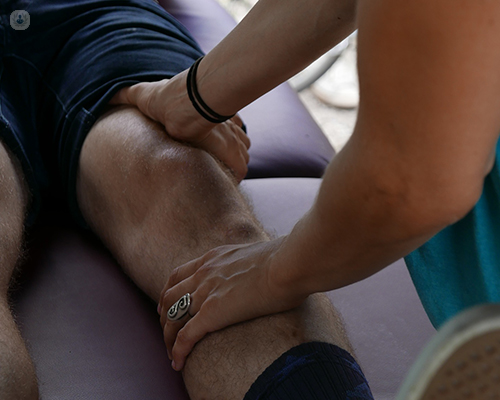Grading the knee: why knee scores are important
Escrito por:Many people are familiar with all different kinds of questionnaires taken at the doctors. For those who have knee problems, they may have encountered one regarding the knee specifically, known as a “knee score”. Explaining more about this, highly-regarded orthopaedic surgeon Mr Christopher Bailey goes into detail about what can be expected in this article.

What’s a “knee score” and why am I being asked for one?
The term “knee score” may have come up if you’ve ever considered and looked into knee replacement surgery. If you haven’t, it may sound a little perplexing like an obscure goal scoring technique for an unheard-of sport. In fact, it is quite commonplace within orthopaedics and you are very likely to be asked to fill one out if you are up for a major knee operation.
What is a knee score?
Basically, a knee score is a questionnaire-based tool used to evaluate pain and function of the knee joint. As it is a score, each time you complete it, it can rise or fall. Usually before and after an operation, it is used to measure how well or poorly a knee is faring. There are various types of knee scores – some completed by specialists or surgeons, others completed by patients. The most commonly used for patients is the Oxford Knee Score (OKS). It’s now used to assess other treatments but was originally created for total knee replacements.
How does the scoring work?
The OKS is comprised of 12 questions, each containing five possible answers. Some questions focus on pain:
How would you describe the pain you usually have from your knee?
Answers range from “None” to “Severe”.
Other questions focus on function:
“Could you walk down one flight of stairs?”
“Could you do the household shopping on your own?”
Answers range from “Yes, easily” to “No, impossible”.
All answers are scored on a number scale from 0 to 4, with zero being the worst outcome and four being the best. The scores are then added up to get an overall total, with the best possible being 48*.
Why are knee scores useful?
There’s a number of ways that they can be helpful. Firstly, they present a baseline for the condition of the knee before surgery. After the surgery, the baseline can be used to track progress moving forward, where the score should rise in most cases. It is a helpful metric for surgeons to monitor the new joint and for the patient to look back on their recovery journey – both hopefully seeing the progress made. In a more general sense, the knee scores help the healthcare industry identify any trends that can indicate a problem and monitor new implants and techniques.
What are their limitations?
The knee scores are very individual, as one person’s “moderate” pain may feel more severe to another. Equally, struggles with tasks might be more due to a bad back than a painful knee, however, that would not be reflected on the score. In other words, it’s more of a personal perspective rather than a scientific measurement. For this reason, it can be unhelpful to jump to sweeping conclusions about the total score. For instance, it doesn’t necessarily mean that a patient absolutely must have a total knee replacement if they have a low score. Additionally, there’s the question of expectations. A 100-year-old may be rather satisfied to move up and down stairs better than before, though that outcome is likely to be dissatisfying for a much younger patient who is desperate to return to more rigorous activities. There is a balance to be struck. However, knee scores can be very helpful as a general indicator for progress after surgery.
*Originally, the OKS used a different scoring system, where the best outcome was a low total and vice versa. Some older studies and articles may show this, so it’s worth checking which scoring method was used.
What are some useful resources?
An example Knee Score questionnaire (from the Shrewsbury and Telford Hospital NHS Trust).
Three key online resources to help you feel confident about replacement surgery.
If you are experiencing knee issues and may need surgery or would like more information, you can book a consultation on Mr Bailey’s Top Doctors profile.


